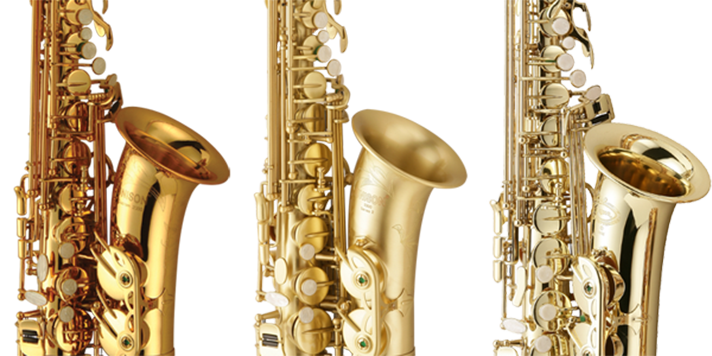The Unison sax company was started about 20 years ago by Shunwa Chang and at the time of writing, Rheuben Allen was president of the company (he now owns his own company).
Unison has a few different models of saxophones including student saxes, the S Series saxophones and the new Hollywood Legend saxes. The S Series is their professional line; the S100 – straight soprano, the S200 – curved soprano, the S300 – alto, the S400 – tenor, and S500 – bari. The saxes are designed by the people at Unison, brought to professional players, and adjustments are made according to the input from the players.
Unison saxes are well-known as being easy to play, with good pitch and response at a good price. They have several lacquers – shiny polished silver, polished gold (standard gold lacquer), black nickel with gold keys, black nickel with silver keys, silver body with gold keys, satin silver, and satin gold. Unison plates their gold over nickel as opposed to silver which gives it its quicker response. Other features specific to Unison saxes are their under slung octave key (the idea came from the old Buescher saxes), and low bracing on the low keys – i.e. low C, B, Bb. Unison is also the only company that manufactures the keyless sax – originally designed by Sigurd Rascher in the 50s to help players learn altissimo and the overtone series.
For a long time, I played on Unison saxes – the S300 alto, a custom tenor, and an S100 soprano. I was previously playing on a Yamaha student sax and was looking for a better, affordable, higher level (professional) sax to switch to and in my search I found the Unison saxes.
When I began playing Unison saxes, they had not become popular yet, but I tried them out and sounded better on them than what I had. When I was trying them out, I tried out a few variations on the sax – I tried out the gold lacquer, the black lacquer with gold keys, and the black lacquer with silver keys. I ended up liking the way I sounded on the gold lacquer the best. So, I figured it would be good to move to Unison saxes. At the time, I was already playing a Unison satin gold curved soprano, but didn’t really like it. I never was fond of curved sopranos because they sound too “honky” to me, which is why I switched to the black lacquer straight soprano (which I love).
While playing on my Unison Saxes, I found they were pretty decent, and much better than having a student sax. When you switch to a better sax, you find that things lay a little easier on the horn. The sax also had more keys which gave me a better range on the horn and helped with intonation, giving me more variations on fingerings. The pinky keys also were easier to use and slide from one to the other than the student Yamaha sax. The Unison gold lacquer saxes (my tenor and alto) were a little resistant (which I only discovered when I made a move to the sax I play on now), but I was happy with how I sounded.
However, overtime, I found that the durability of the Unison Saxes was not as good as it could be. I use my horns at least three hours a day – and after a year or so it just wore the saxes out. At one point, I was playing my alto in a musical, and the frequent rehearsals and performances began to wear down on my sax. After a few weeks, keys, pads and screws would come loose and in a few cases, fall off. I recently ran into another sax player who also plays Unison horns, and she said the same thing – it’s a great sax, but it just doesn’t hold up very well.
I recently switched to playing the black lacquer Yamaha 875EX. I switched because the sax played better than my Unison. I could control it more, it sounded fuller, and it just felt better to me. Essentially, I sounded better not working as hard as I did to sound good on my Unison. Overall, I think the Unison saxes are a really good quality, affordable sax. I still have my Unison alto as a “back-up” sax and still play Unison tenor and soprano. I think that Unisons would make a great “back-up” sax or intermediate/professional sax for high school/college kids.
[template id=”182″]
